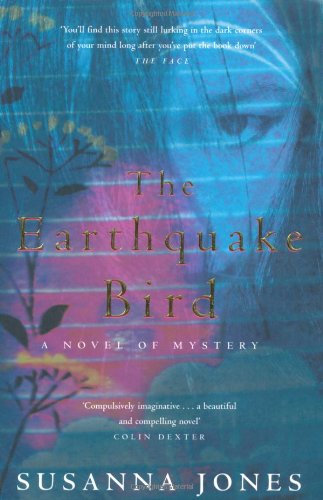
How would you react if you were arrested for murder?
Would you be angry? Frightened? Horrified? Or would you reflect on the prevalence of earthquakes in your adopted city? If the latter sounds like you then you might get along very well with Lucy Fly, English-born, Tokyo-based and newly minted murder suspect.
What’s it about?
Within the first few pages of this mystery, Lucy is arrested for the murder of a friend. Did she do it? While the police attempt to interrogate her, she sits quietly, sifting through her memories, sharing with the reader her family history and relating the development of two recent relationships – including her connection to the murder victim.
What’s it like?
Although this is presented as a murder mystery, and there is a focus on solving the crime, this is a psychological drama rather than a police procedural. As I read, I was drawn into Lucy’s world to such an extent that it was a fresh shock each time I was returned to the police station and the ineffectual remarks of the policemen. This feels like a character study or a fictional memoir and readers will want to know – Who is Lucy? What made her this way? Is she really capable of taking a life? As the novel develops we see death stalk Lucy and it seems horribly plausible, almost logical, that she might graduate to carrying it out. Taking her psychological portrait is the reader’s ultimate aim.
‘I was somewhere in my own thoughts while her words covered the air around us like wallpaper.’
Perhaps simply to heighten to the sense of strangeness, Jones has Lucy regularly refer to herself in the third person. For instance: ‘Lucy hasn’t always had a happy relationship with trees but it isn’t fair to condemn all for the crimes of one.’ On reflection, that would be a pretty strange sentence even if it were written in the first person, but I found the switching between first and third made the narration feel slightly disjointed. This is appropriate as Lucy does seem out of joint with her surroundings and the unusual narrative tic may be designed to show us how distant she is from herself, never mind other people. Lucy is an intriguing character who regularly reveals more to the reader than she herself may understand, though she does not believe herself to be naive. She shares a number of attributes with the murder victim, suggesting that she is also a victim of a kind.
‘Lily stared at me, appalled that a word could be both so foreign and so long.’
Jones writes very carefully and deliberately so it feels like every detail could be significant in some way, from the earthquake that opens the story to the ripples in the puddle Teiji photographs. This helped to make the story feel powerful and engrossing, imbuing every moment with potential weight. Lucy works as a translator and seems to exist as an observer of society rather than a participant, giving the reader an insight into Japanese culture and Tokyo’s georgraphy as she reflects on her experiences in detail. (‘We discussed the cake, the wagashi. The soft, sticky bun was wrapped in a leaf. I didn’t know what tree it was picked from but it tasted sharp and sweet.’) The descriptive details evoke a world that is at once different and familiar: ladies sip tea, girls sit in noodle bars. Although this tale of obsession could be set anywhere, Jones firmly roots it in Tokyo, presumably with accuracy as the author has lived and worked there.
Final thoughts
Although I didn’t find the opening gripping in the manner implied by the blurb, I soon found Lucy’s character intriguing and read the story quickly with enjoyment. The ending is ambiguous with much left unresolved but there is a clear sense of conclusion and the reader is left pondering rather than wondering. Jones’ descriptions of Japan’s landscapes, customs, people and language are clear and interesting. Characters and details are convincing. It’s beautifully written in lean, easy-to-read prose with occasional deft touches of humour. At 253 pages it’s a relatively short read and is so compelling that you might find yourself staying up late to finish it in one sitting.
This is Jones’ debut novel and I am really looking forward to reading the novels she has written since – ‘Water Lily’, ‘The Missing Person’s Guide to Love’ and ‘When Nights Were Cold’.
Highly recommended.